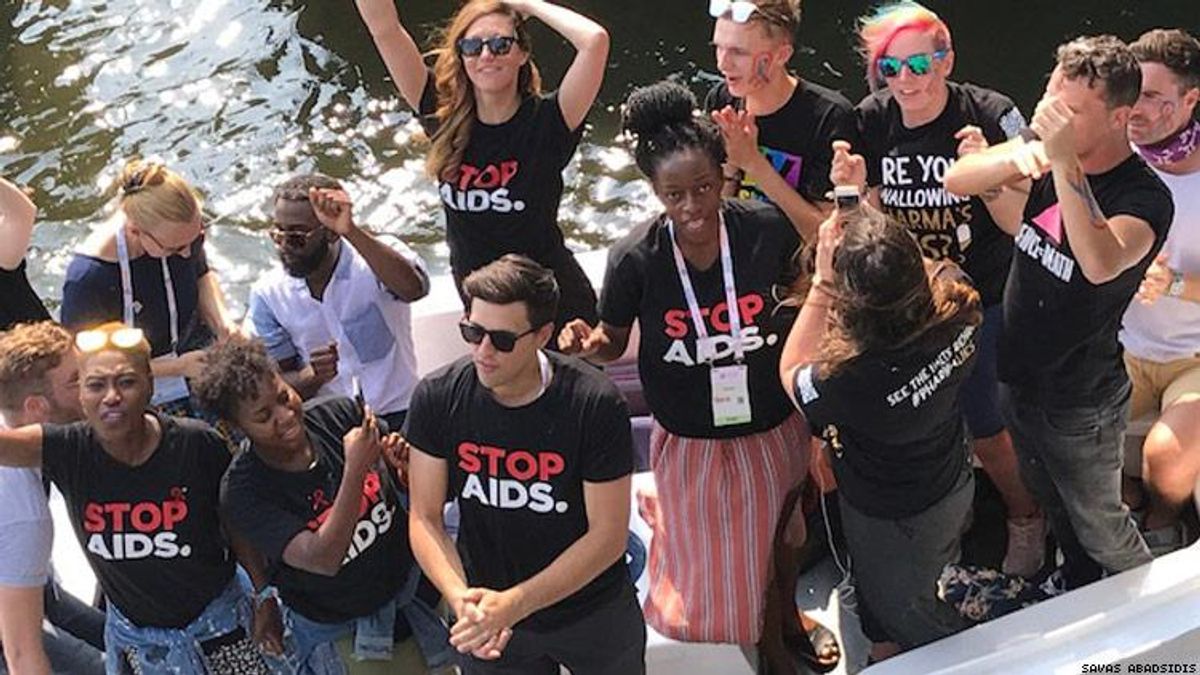The Magere Brug or "Skinny Bridge" in English is a tourist destination in Amsterdam attracting millions of people a year.
A story told to tourists about the origin of the 1691 version of the bridge is that it was built by two wealthy sisters who lived on opposite sides of the Amstel river and wanted to be able to visit one another every day. The sisters, although wealthy, were not quite wealthy enough to afford a bridge of adequate width for general use and so built a very narrow bridge, hence its name. Either way today it was the site of a protest by StopAIDS and Health Gap at the 22nd International AIDS Conference in Amsteradm (#AIDS2018) today.
The activist organizations are responding to the $6 billion annual funding gap that UNAIDS has identified and published in conjunction with the Kaiser Health Foundation in 2017.

This alarming situation comes at a critical moment in the HIV response as UNAIDS cautions that global estimates are off track to meet the 2020 targets on prevention and HIV related deaths. If these targets are missed then we will not be on track to meeting the Sustainable Development Goal of ending AIDS by 2030.
"New HIV infections are declining too slowly with 1.8 million people newly acquiring HIV in 2017. New infections have declined by only 18 percent since 2011. In some regions, including Eastern Europe and Central Asia the rate of new infections is actually increasing. Nearly 1 million people died of AIDS related causes in 2017 compared to the target of reducing deaths to below 500 000 per year by 2020. Just over half of people living with HIV currently have access to treatment with 15 million people still waiting for access to treatment," says StopAIDS spokesperson Alysa Remtulla.
"AIDS is not over, but it can be. With just two years to reach the 2020 targets, the leading donors in the global HIV response must reverse current trends and increase political and financial commitment to achieve them." Remtulla concludes.
What motivated the protest? "We're at a critical moment in the global HIV response right now. We have the knowledge and the tools we need to end the AIDS epidemic yet there's overwhelming evidence coming out of UNAIDS that we are off track to meet the 2020 targets on reducing new HIV infections and AIDS related deaths. If we miss these targets we risk also missing the Sustainable Development Goal of ending AIDS by 2030. While the evidence shows we need to scale up our investments in the global HIV response and fill an annual funding gap of $6 billion, donor governments are stepping back from the plate, with 8 out 14 donor governments reducing funding for the global HIV response in 2017.
In the US and the UK, the two biggest donor governments, we've also seen some signs that their governments are deprioritizing the global HIV response. We wanted to remind the public the HIV and AIDS isn't yesterday's challenge and that increased financial and political commitment from donors is still urgently needed to end AIDS by 2030.
For STOPAIDS this is protest is part of a bigger piece of work calling on the UK to renew financial and political commitment to the global HIV response. We were thrilled to have UK Minister Alistair Burt demonstrate his political leadership by attending the conference and we welcomed his announcement of an increased contribution to the Robert Carr Network Fund. But the increase announced (£6 million over three years compared to £ 5 million over the previous 3 years) is dwarfed by the wider funding picture - particularly scale of the funding challenge identified by UNAIDS.' "
Do you think this issue has received enough traction at this conference? It was fantastic to have so many activists from around the world come out and support us yesterday during our protest! Obviously the conference is a crowded space and this is just one of the many important issues that need to be discussed. I was encouraged that UNAIDS themselves launched a press release sounding the alarm bell and warning that progress was slowing and that time was running out to reach the 2020 targets and Maureen Milanga from Health Gap also raised the issue effectively in a press conference on the funding gap. What I haven't seen is recognition from donor governments of the extent to which we are off track or any specific commitments made to filling the funding gap that's been identified.













































































